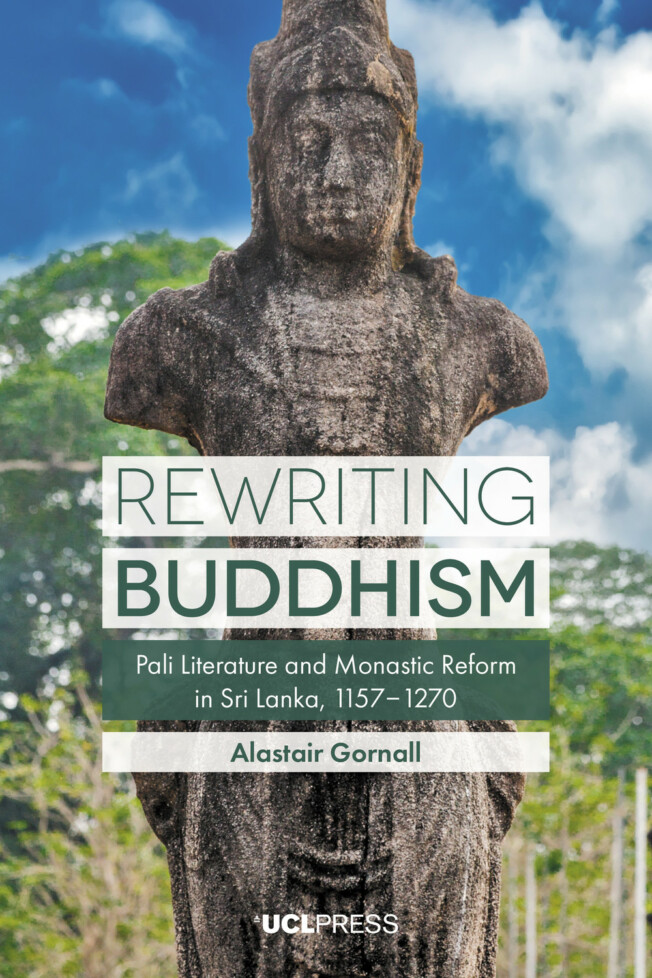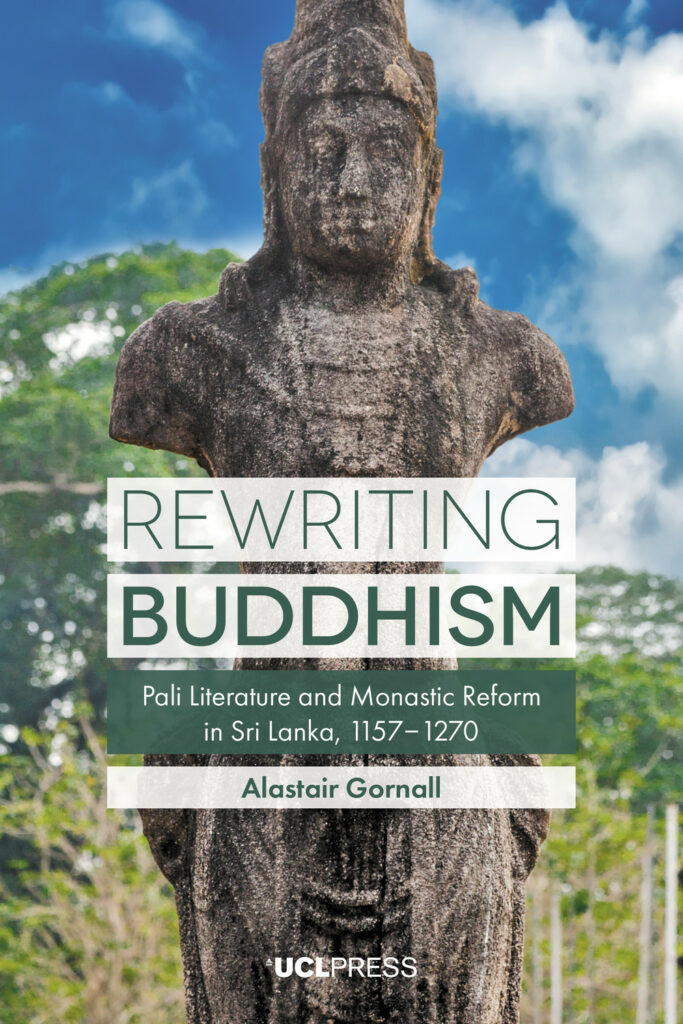
Rewriting Buddhism
Pali Literature and Monastic Reform in Sri Lanka, 1157–1270
Alastair Gornall (Author)
Rewriting Buddhism is the first intellectual history of premodern Sri Lanka’s most culturally productive period. This era of reform (1157–1270) shaped the nature of Theravada Buddhism both in Sri Lanka and also Southeast Asia and even today continues to define monastic intellectual life in the region.
Alastair Gornall argues that the long century’s literary productivity was not born of political stability, as is often thought, but rather of the social, economic and political chaos brought about by invasions and civil wars. Faced with unprecedented uncertainty, the monastic community sought greater political autonomy, styled itself as royal court, and undertook a series of reforms, most notably, a purification and unification in 1165 during the reign of Parakramabahu I. He describes how central to the process of reform was the production of new forms of Pali literature, which helped create a new conceptual and social coherence within the reformed community; one that served to preserve and protect their religious tradition while also expanding its reach among the more fragmented and localized elites of the period.
Praise for Rewriting Buddhism
‘Clearly, concisely …and richly documented, Rewriting Buddhism manages to depict in all its complexity the place occupied by pali literature in a particular sequence in the history of Sri Lanka.’
Bulletin de l’École française d’Extrême-Orient
‘A masterful contribution towards the resolution of what Steven Collins designated as being ‘the problem of literature in Pali,’ that is, the question as to why Pali kāvya emerged when and where it did (Collins 2003, 649–50). Meticulously researched, philologically rigorous, and intellectually capacious in its engagement with issues in grammar, poetics, philosophy of language, and sociology, Gornall delivers an engaging book surely to be of interest to specialists of premodern South Asian literature, Theravada Buddhism, and historians of India and Sri Lanka.’
Religion
‘This original and learned work not only constitutes a major intervention in Buddhist studies but also “rewrites” the history of Sri Lanka, offering a major rethink of a pivotal period in the island’s history and of the Theravada tradition more generally. It deserves to be widely read.’
Alan Strathern, University of Oxford
‘an important and welcome contribution to the study of premodern South Asian intellectual history and Pali literature and to scholarship on Buddhist textuality and institutional life in what is now Sri Lanka’
H-Buddhism
1. Introduction: Themes and theories
Part I: Chaos
2. Before 1165 and all that
3. The reform era and its Pali literature
Part II: Order
4. Scholarly foundations: Moggallāna’s grammar
5. Buddhist scholasticism: Sumaṅgala’s commentaries
6. Eschatological encyclopedism: Siddhattha’s anthology
Part III: Emotion
7. Sense and sensibility: Saṅgharakkhita’s poetics
8. The politics of relics: Dhammakitti’s history
9. Devotional power: Buddharakkhita’s Buddha biography
10. Conclusion: Other lives and afterlives
References Index
DOI: 10.14324/111.9781787355156
Number of pages: 308
Number of illustrations: 8
Publication date: 17 March 2020
PDF ISBN: 9781787355156
EPUB ISBN: 9781787355187
Hardback ISBN: 9781787355170
Paperback ISBN: 9781787355163
Alastair Gornall (Author)
Alastair Gornall gained his Ph.D. in South Asian Studies from the University of Cambridge in 2013. He is currently Assistant Professor in the Humanities at the Singapore University of Technology and Design, Research Associate in the Department of the Languages and Cultures of South Asia at SOAS, University of London, and was 2018 Robert H. N. Ho Family Foundation Research Fellow in Buddhist Studies. His research focuses on the intellectual and cultural history of Buddhism in South and Southeast Asia.
‘A masterful contribution towards the resolution of what Steven Collins designated as being ‘the problem of literature in Pali,’ that is, the question as to why Pali kāvya emerged when and where it did (Collins 2003, 649–50). Meticulously researched, philologically rigorous, and intellectually capacious in its engagement with issues in grammar, poetics, philosophy of language, and sociology, Gornall delivers an engaging book surely to be of interest to specialists of premodern South Asian literature, Theravada Buddhism, and historians of India and Sri Lanka.’
Religion
‘Clearly, concisely …and richly documented, Rewriting Buddhism manages to depict in all its complexity the place occupied by pali literature in a particular sequence in the history of Sri Lanka.’ Bulletin de l’École française d’Extrême-Orient
‘an important and welcome contribution to the study of premodern South Asian intellectual history and Pali literature and to scholarship on Buddhist textuality and institutional life in what is now Sri Lanka’
H-Buddhism
Extra resources for Rewriting Buddhism
Listen to Alastair Gornall discuss Rewriting Buddhism on the New Books in Buddhist Studies podcast
Related titles
Rewriting Buddhism
Pali Literature and Monastic Reform in Sri Lanka, 1157–1270
Rewriting Buddhism is the first intellectual history of premodern Sri Lanka’s most culturally productive period. This era of reform (1157–1270) shaped the nature of Theravada Buddhism both in Sri Lanka and also Southeast Asia and even today continues to define monastic intellectual life in the region.
Alastair Gornall argues that the long century’s literary productivity was not born of political stability, as is often thought, but rather of the social, economic and political chaos brought about by invasions and civil wars. Faced with unprecedented uncertainty, the monastic community sought greater political autonomy, styled itself as royal court, and undertook a series of reforms, most notably, a purification and unification in 1165 during the reign of Parakramabahu I. He describes how central to the process of reform was the production of new forms of Pali literature, which helped create a new conceptual and social coherence within the reformed community; one that served to preserve and protect their religious tradition while also expanding its reach among the more fragmented and localized elites of the period.
Praise for Rewriting Buddhism
‘Clearly, concisely …and richly documented, Rewriting Buddhism manages to depict in all its complexity the place occupied by pali literature in a particular sequence in the history of Sri Lanka.’
Bulletin de l’École française d’Extrême-Orient
‘A masterful contribution towards the resolution of what Steven Collins designated as being ‘the problem of literature in Pali,’ that is, the question as to why Pali kāvya emerged when and where it did (Collins 2003, 649–50). Meticulously researched, philologically rigorous, and intellectually capacious in its engagement with issues in grammar, poetics, philosophy of language, and sociology, Gornall delivers an engaging book surely to be of interest to specialists of premodern South Asian literature, Theravada Buddhism, and historians of India and Sri Lanka.’
Religion
‘This original and learned work not only constitutes a major intervention in Buddhist studies but also “rewrites” the history of Sri Lanka, offering a major rethink of a pivotal period in the island’s history and of the Theravada tradition more generally. It deserves to be widely read.’
Alan Strathern, University of Oxford
‘an important and welcome contribution to the study of premodern South Asian intellectual history and Pali literature and to scholarship on Buddhist textuality and institutional life in what is now Sri Lanka’
H-Buddhism
‘A masterful contribution towards the resolution of what Steven Collins designated as being ‘the problem of literature in Pali,’ that is, the question as to why Pali kāvya emerged when and where it did (Collins 2003, 649–50). Meticulously researched, philologically rigorous, and intellectually capacious in its engagement with issues in grammar, poetics, philosophy of language, and sociology, Gornall delivers an engaging book surely to be of interest to specialists of premodern South Asian literature, Theravada Buddhism, and historians of India and Sri Lanka.’
Religion
‘Clearly, concisely …and richly documented, Rewriting Buddhism manages to depict in all its complexity the place occupied by pali literature in a particular sequence in the history of Sri Lanka.’ Bulletin de l’École française d’Extrême-Orient
‘an important and welcome contribution to the study of premodern South Asian intellectual history and Pali literature and to scholarship on Buddhist textuality and institutional life in what is now Sri Lanka’
H-Buddhism

